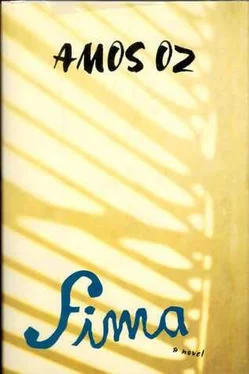9. "THERE ARE SO MANY THINGS WE COULD TALK ABOUT, COMPARE"
FIMA STILL HAD A COUPLE OF HOURS LEFT BEFORE HE HAD TO BE at work. He thought he would change the sheets, and while he was at it his shirt and underwear and the dishtowels and the bathroom towels, and drop the whole lot off at the laundry on his way to the clinic. When he went into the kitchen to take the towel off its hook, he saw that the sink was full of dirty dishes and that there was a frying pan on the drainboard with pieces of food in it, while on the table the jam had congealed in a jar that had lost its lid. A rotting apple was attracting swarms of flics on the windowsill. Fima gingerly picked it up between forefinger and thumb, as though it might be contagious, and threw it in the trash can under the overfull sink. But the can was overfull too. The infected apple rolled off the top of the heap and managed to find itself a hiding place among the old canisters and bottles of cleaning fluid. It could only be reached by getting down on all fours. Fima made up his mind that this time there would be no compromise, he would not give up as usual, he would recapture the fugitive at all costs. If he succeeded, he would take it as a green light, and he would maintain the momentum by taking the trash can downstairs to empty it. On the way back he would remember to fish the newspaper and his mail out of the box at last. He would continue by washing and tidying the refrigerator, and at the risk of making himself late he would even change the sheets.
But when he prostrated himself and started searching behind the trash can for the lost apple, he discovered half a roll, a greasy margarine wrapper, and the burned-out light bulb from yesterday's power cut, which it suddenly dawned on him was probably not burned out after all. Suddenly a cockroach came strolling toward him, looking weary and indifferent. It did not try to escape. At once Fima was fired with the thrill of the chase. Still on his knees, he slipped off a shoe and brandished it, then repented as he recalled that it was just like this, with a hammer blow to the head, that Stalin's agents murdered the exiled Trotsky. And he was startled to discover the resemblance between Trotsky in his last pictures and his father, who had been here a moment before begging him to marry. The shoe froze in his hand. He observed with astonishment the creature's feelers, which were describing slow semicircles. He saw masses of tiny stiff bristles, like a mustache. He studied the spindly legs seemingly full of joints. The delicate formation of the elongated wings. He was filled with awe at the precise, minute artistry of this creature, which no longer seemed abhorrent but wonderfully perfect: a representative of a hated race, persecuted and confined to the drains, excelling in the an of stubborn survival, agile and cunning in the dark; a race that had fallen victim to primeval loathing born of fear, of simple cruelty, of inherited prejudices. Could it be that it was precisely the evasiveness of this race, its humility and plainness, its powerful vitality, that aroused horror in us? Horror at the murderous instinct that its very presence excited in us? Horror because of the mysterious longevity of a creature that could neither sting nor bite and always kept its distance? Fima therefore retreated in respectful silence. He replaced his shoe on his foot, ignoring the rank smell of his sock. And he closed the door of the cupboard under the sink gently, so as not to alarm the creature. Then he straightened up with a grunt and decided to put off the household chores to another morning, because there were so many of them and they seemed unfairly burdensome.
He switched the electric kettle on to make himself a cup of coffee, turned the radio to the music program, and managed to catch the beginning of Fauré's Requiem, whose tragic opening notes made him stare out the window for a while in the direction of the Bethlehem hills. Those people of the future his father had mentioned, who a hundred years from now would live in this very flat without knowing anything about him or his life, would they really never feel any curiosity about who had lived here at the beginning of 1989? But why should they? Was there anything in his life that might be of use to people whose parents had not even been born yet? Something that might at least provide them with food for thought as they stood at this window on a winter's morning in the year 2089? No doubt in a hundred years' time jet-propelled vehicles would have become so commonplace that the people living here would have no special reason to remember Yael and Teddy, or Nina and Uri and their crowd, or Tamar and the two gynecologists. Even Tsvi Kropotkin's historical research would probably be out of date by then. At most all that would remain of it would be a footnote in some obsolete tome. His envy of Tsvi seemed pointless, vain, and ridiculous. That envy that he obstinately denied, even to himself, and whose insidious nibbling he silenced with endless arguments, calling Tsvi up on the phone and slipping in a question, out of the blue, about the exiled king of Albania, entangling them in a bad-tempered argument about Albanian Islam or Balkan history. After all, in the B.A. exams Fima had had slightly better marks than his friend. And he was the one who had had certain brilliant insights that Tsvi had made use of, insisting despite Fima's protestations on acknowledging him in footnotes. If only he could overcome his tiredness. He still had it in him to leap ahead, make up the time lost in the billy-goat year, and in a couple of years overtake that spoiled, conventional professor, clad in his sporty blazer and whining out his bland truisms. Not a stone would be left standing of all Kropotkin's edifices. Fima would smash and flatten the lot like a hurricane. He would cause an earthquake and establish new foundations. But what was the point? At the very most some student at the end of the next century would refer in passing, in a parenthesis, to the outmoded approach of the Nisan-Kropotkin school which enjoyed a short-lived vogue in Jerusalem in the late twentieth century, in the declining phase of the socioempiric period, which was marred by hyperemotionalism and the use of clumsy intellectual tools. The student would not even take the trouble to distinguish between them. He would link them together with a hyphen before closing the brackets on the two of them.
The student, who would live in this flat a century from now, suddenly took on in Fima's mind the name Yoezer. He could see him in his mind's eye standing at this same window and staring out at those same hills. And he said to him: Don't you mock. It's thanks to us that you're here. Once there was a tree-planting ceremony in the city of Ramat Gan. The first mayor, the old man, Avraham Krinitzi, stood up in front of a thousand youngsters, from all the nursery schools, each one holding a sapling. The mayor too held a sapling. His task was to make a speech to the children, and he did not know what to say. Suddenly, out of the turmoil of his mind, a one-sentence speech burst forth, delivered with a heavy Russian accent: "Moy dzear cheeldren, you are the trees, and we are the manure." Would there be any point in carving that sentence here, on the wall, like a prisoner on the wall of his cell, for that arrogant Yoezer to read? To force him to think about us? But by then surely the walls will have been repainted, replastered, perhaps even rebuilt. In a hundred years life will be more vital, more vigorous, more reasonable, and more joyful. The wars with the Arabs will be remembered with a shrug, as a sort of absurd cycle of obscure tribal skirmishes. Like the history of the Balkans. I don't suppose Yoezer will waste his mornings hunting cockroaches or his evenings in grubby eating places behind Zion Square. Which will probably have been completely flattened and rebuilt in an energetic, optimistic style. Instead of eating greasy fried eggs, jam, and yogurt, they'll probably just swallow a couple of capsules every few hours. No more filthy kitchens, no more ants and cockroaches. People will be busy all day with useful, exciting things, and their evenings will be devoted to learning and beauty. They will live their lives in the bright light of reason, and if ever there are any stirrings of love, there will probably be some way of exchanging minute electromagnetic pulses from a distance to find out in advance whether it is a good idea to translate this love into physical intimacy. The winter rain will have been swept away from Jerusalem forever. It will be diverted to the agricultural regions. Everyone will be taken across safely to the Aryan side, as it were. Nobody, nothing will smell bad. The word "suffering" may sound to them the way the word "alchemy" does to us.
Читать дальше












